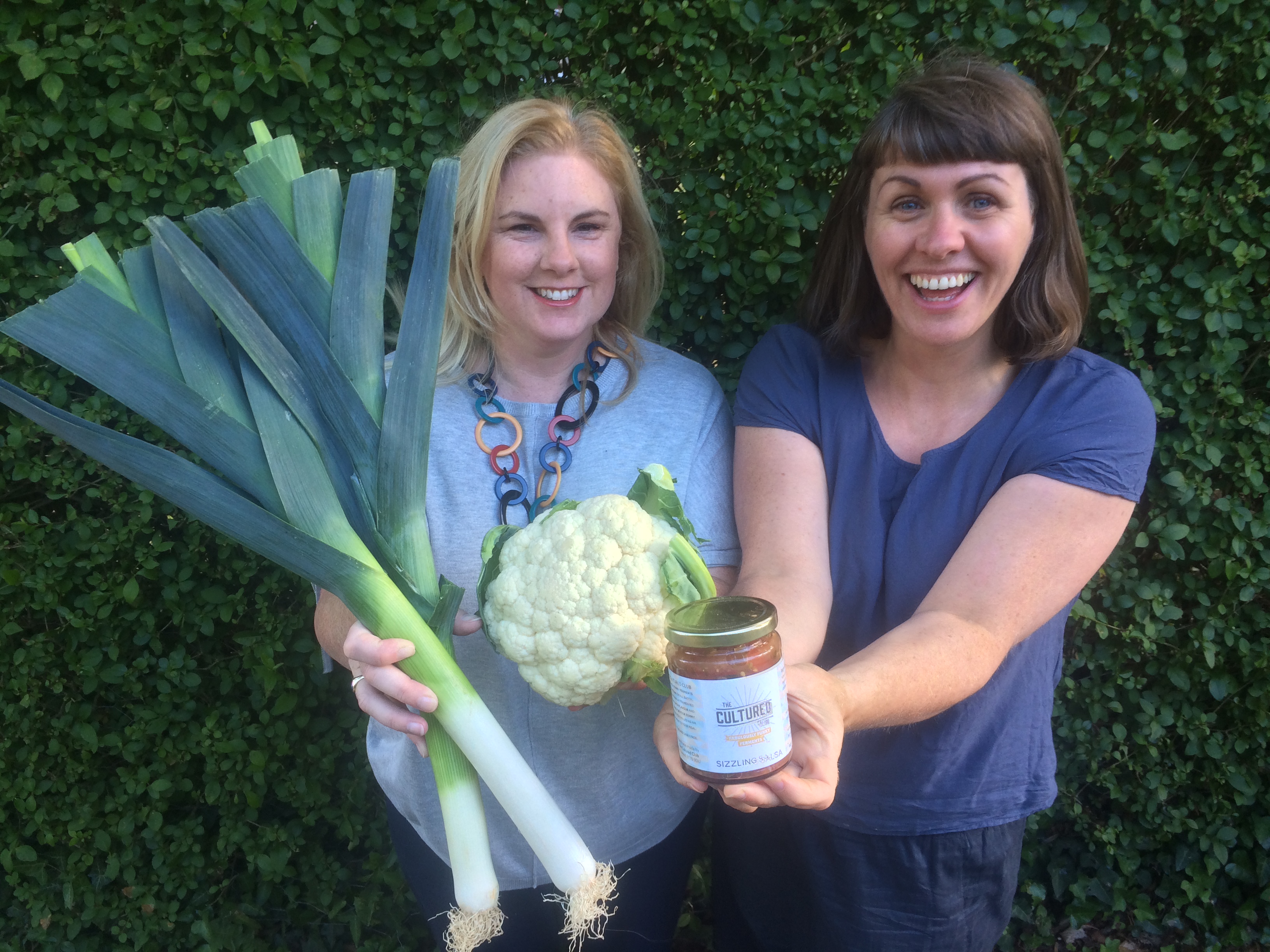Gut health and mood to be explored at Belfast conference

Planting an idea for a healthier diet, left, Sharon Machala of Making Connections and Dearbhla Reynolds, The Cultured Club, both based in Bangor.
The influence of healthy eating on gut health and mood will be explored at a major conference in Belfast in September.
Depression currently affects up to half a million people in Ireland, causing severe trauma for sufferers and their loved ones. But what if happiness was made in your bowels instead of through your thoughts? This is the question to be addressed at the conference, Good Food and The Psychobiotic Revolution on 20 September, by leading experts.
Behind the important initiative are businesswomen Sharon Machala and Dearbhla Reynolds, both from Bangor and the key personalities in Cultured Connections, a unique collaboration focused on nutrition.
Both run small food-focused businesses and are collaborating to increase awareness of the importance of protecting and feeding good bacteria in the digestive system. Both also share a love of good and healthy food with outstanding flavours.
Sharon runs Making Connections, a consultancy specialising in brokering connections, especially between chefs and producers, within the local food industry, while Dearbhla is a food writer and author of The Cultured Club – Fabulously Funky Ferments, a widely acclaimed guide to the health and other benefits of fermented foods. She’s described as a “culinary radical’. Sharon also has a successful track record in the local food industry including a key role with Food NI, the pioneering promotion body.
They are convinced that choosing to eat the right mood boosting foods can help overcome depression and reduce a costly dependence on prescribed anti-depressants.
Sharon, who has vast experience in food processing and catering, explains: “It is clearer now than ever before that there are certain gut bacteria which can positively influence our mood and behaviour – in other words, we are what we eat.”
This conviction is backed up by academic research carried out by Ted Dinan, Professor of Psychiatry at University College Cork (UCC), one of the world’s main experts on the link between mental health and our gut health.
“In his laboratory, Prof Dinan found that the consumption of certain probiotic bacteria can actually alter the chemistry of the brain. These microbes that chase the blues are called ‘psychobiotics’, Sharon adds.
Prof Dinan, Principal Investigator in the Alimentary Pharmabiotic Centre at UCC will be a key contributor to their conference ‘Good Mood and Food -The Psychobiotic Revolution’ on 20 September.
Other experts taking part in the conference, the first of its type to be held in Northern Ireland, include Prof Siobhan O’Neill, Professor of Mental Health Sciences at Ulster University.
This event will include a special lunch comprised of mood boosting foods as well as a workshop on fermentation and probiotic drinks.
Why choose fermented foods? “Fermentation is actually one of the oldest techniques for preserving food. What the process does is to encourage essential and good bacteria to flourish in the gut,” explains Dearbhla. “It’s a good source of probiotics that aid digestion. So, adding a daily dose of fermented foods to your diet can have an extraordinary impact on health.
“Fermented foods have been shown to promote digestive ease for people suffering with inflammatory disorders, help manage sugar and carb cravings, decrease incidence of allergies and sensitivities, generally boost the immune system and contribute to an overall sense of well-being,” she continues.
Sharon adds: “What we eat determines our mood, specifically how foods rich in probiotics can affect mental health. Fermented foods can ease anxiety and counter depression.
“There’s growing recognition worldwide of the benefits of a diet that includes plenty of fresh vegetables and other plants,” she says. “Fermentation enables plants to be eaten throughout the year and also involves a process that kills off ‘bad’ bacteria.”
The process, Dearbhla explains, can involve submerging fresh vegetables in a salty brine during preparation to kill off dangerous, pathogenic bacteria. The good bacteria break down lactose and other sugars and starches in the food, making digestion easier. And once they reach the gut, they continue to help break down food and keep out potentially serious threats to health like E. coli and C. difficile.
Fermented vegetables, for instance, begin with lacto-fermentation, a method of food preservation that also enhances the nutrient content of the food. The action of the bacteria makes the minerals in cultured foods more readily available to the body. The bacteria also produce vitamins and enzymes that are beneficial for digestion.
Dearbhla adds that almost any root vegetable can be fermented, and fermenting farm-fresh produce is “a great way to provide good nutrition year-round! Ferment one vegetable alone or create mix of many different kinds, along with herbs and spices, for a great variety of cultured foods”.








